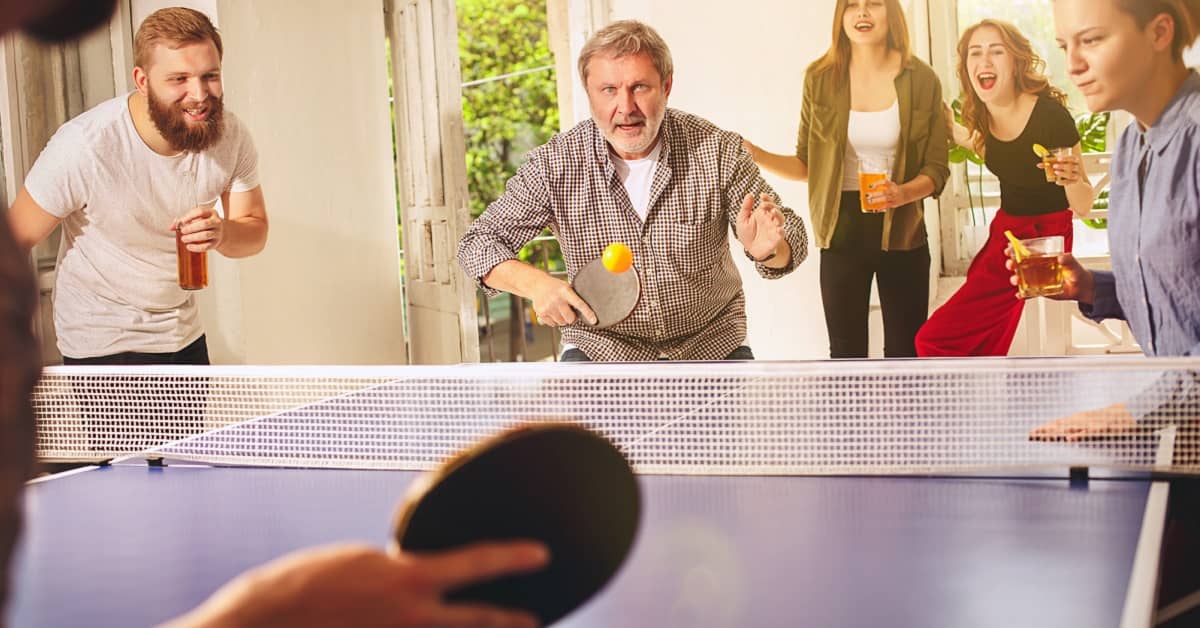
Improvements in Dementia Rating
Research at the Mayo Clinic was among the first to show real benefits of playing ping pong in patients suffering from dementia. Later, two Japanese neuroscientists carried out their own research involving 3,000 elderly ping pong players in the 1990s. They discovered the sport uniquely activates as many as five separate parts of the brain simultaneously, and the results were pretty amazing. Researchers observed physical, mental and emotional improvements that included no longer requiring wheelchair assistance for walking, and a drop in acute depression. Some of those with dementia improved so much they saw their dementia rating downgraded by the end of the study. The neuroscientists described ping pong as "the optimal sport for people of middle and advanced ages as well as for brain disease patients."Grows New Brain Cells in Memory/Learning Areas of Brain
In a small study conducted in 2016, scientists performed before-and-after cognitive tests and brain scans on healthy men and women aged over 60 who played ping pong for one hour twice a week for ten weeks. Results showed improved cognitive scores, growth of neurons in the hippocampus -- a key area for memory and learning -- and increased thickness of the cortex, a brain region needed for higher thought processes. This was an important finding because it's the part of the brain that shrinks the most with aging. Researchers also found playing ping pong improves other neurological diseases like Parkinson’s.Ping Pong and Parkinson’s
In February, researchers in Japan released the results of a small study of Parkinson’s patients who played ping pong. Twelve mild to moderate Parkinson's patients with an average age of 73 played ping pong for five hours once a week for six months. Researchers documented significant improvements in speech, handwriting, walking and other movements, as well as ability to get out of bed and to get dressed. Patients experienced less muscle rigidity, improved facial expression, better posture, and fewer hand tremors. Study author Dr. Ken-ichi Inoue from Fukuoka University said, "Ping pong...is a form of aerobic exercise that has been shown in the general population to improve hand-eye coordination, sharpen reflexes, and stimulate the brain. "While this study is small, the results are encouraging because they show ping pong...may improve some symptoms of Parkinson's disease.""Chess on Steroids"
The experience of folks playing the game has long convinced them of the rewards. Will Shortz, crossword puzzle editor of The New York Times, is a huge fan of ping pong and in 2011 opened the Westchester Table Tennis Center (WTTC) in New York. "I think table tennis is especially good because it's a brain sport, training your body to perform instantly in different situations." He calls it "chess on steroids." Wendy Suzuki, professor of neuroscience at New York University, agrees. She believes the high-speed game enhances brain function in a way no other sport can because it involves fine motor control, hand-eye coordination, strategic planning and aerobic exercise. These stimulate the primary motor cortex, cerebellum, prefrontal cortex and hippocampus. Distinguished physician and psychiatrist Daniel Amen concurs, describing ping pong as "the world's best brain sport" because it activates various portions of the brain at the same time.Ping Pong as Alzheimer’s Therapy
Based on the work of the Japanese neuroscientists, sports enthusiasts established the Sport and Art Educational Foundation in Los Angeles in 2007. It's the only organization in the U.S. utilizing ping pong as therapy for patients with early stage Alzheimer's and various forms of dementia. On the east coast, the focus is on Parkinson's. Nenad Bach, a Parkinson’s sufferer, is spearheading the efforts. Bach, who lost his ability to play guitar, began playing ping pong and six months later, he could play guitar again. In 2017, Bach and Art Dubow, a retired psychologist, founded Ping Pong Parkinson's, to help people treat symptoms of the disease and have fun at the same time. Then, last October, Bach created the World Parkinson's Table Tennis Championships to continue that mission. Dr. Dubow sums up the rewards: "They get better on a lot of fronts. It's not just motor functioning. I don't mean the stiffness and the slowness and the tremors. It's not just that. They get better by being more alert. They're able to hold attention. They focus better. There's a lot of cognitive improvement. "Ping pong has a singular virtue in that it is complex neurology. There's a lot involved. That's the good thing, because if it's not challenging, then it's worthless."- https://tabletennisengland.co.uk/news/archived/stay-young-with-help-from-table-tennis/
- https://www.sciencedaily.com/releases/2020/02/200225171757.htm
- https://eu.lohud.com/story/news/local/westchester/pleasantville/2019/10/10/pingpong-international-tournament-parkinsons-disease-pleasantville/3901084002/
